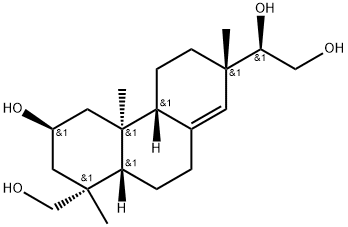
52659-56-0
| Name | KIRENOL |
| CAS | 52659-56-0 |
| Molecular Formula | C20H34O4 |
| MDL Number | MFCD00210519 |
| Molecular Weight | 338.48 |
| MOL File | 52659-56-0.mol |
Chemical Properties
| Melting point | 197.0 to 201.0 °C |
| Boiling point | 516.9±35.0 °C(Predicted) |
| density | 1.17±0.1 g/cm3(Predicted) |
| storage temp. | -20°C Freezer |
| solubility | Ethanol (Slightly), Methanol (Slightly) |
| form | Solid |
| pka | 14.06±0.20(Predicted) |
| color | White to Light Yellow |
| Cosmetics Ingredients Functions | ANTIMICROBIAL HAIR CONDITIONING SKIN CONDITIONING - EMOLLIENT ANTIOXIDANT |
| InChI | InChI=1/C20H34O4/c1-18(17(24)11-21)7-6-15-13(8-18)4-5-16-19(2,12-22)9-14(23)10-20(15,16)3/h8,14-17,21-24H,4-7,9-12H2,1-3H3/t14-,15-,16-,17+,18+,19+,20+/s3 |
| InChIKey | NRYNTARIOIRWAB-QNOIMPALNA-N |
| SMILES | C[C@@]12C[C@H](O)C[C@@](C)(CO)[C@@]1([H])CCC1=C[C@@](C)([C@@H](O)CO)CC[C@@]21[H] |&1:1,3,6,10,16,18,24,r| |
| CAS DataBase Reference | 52659-56-0 |